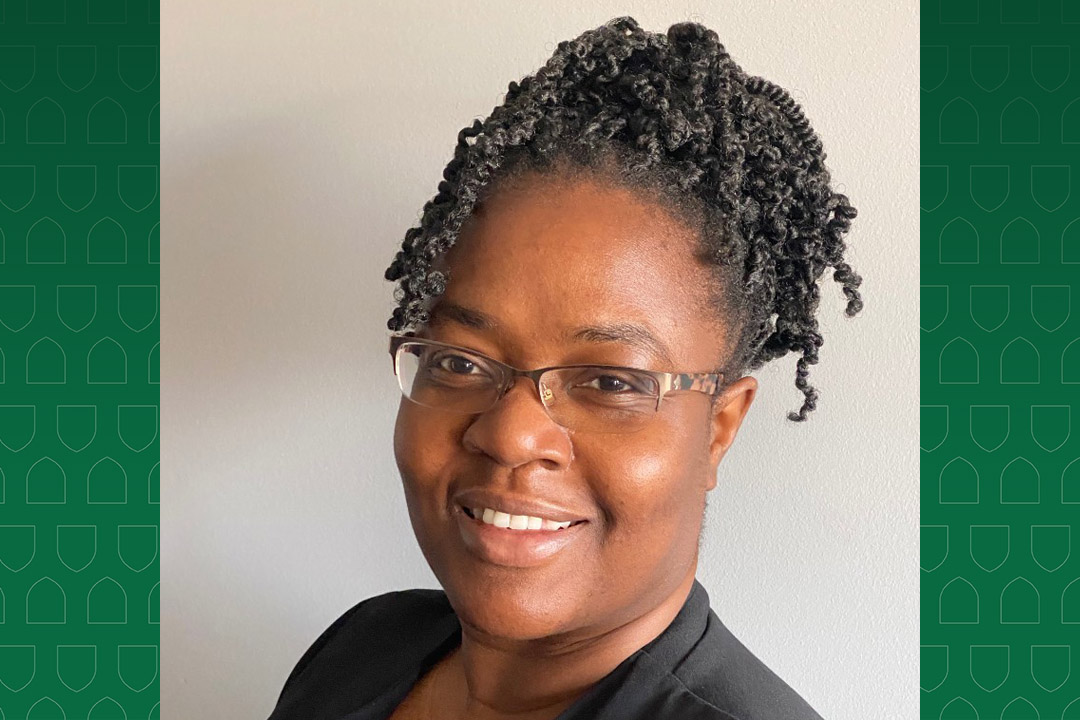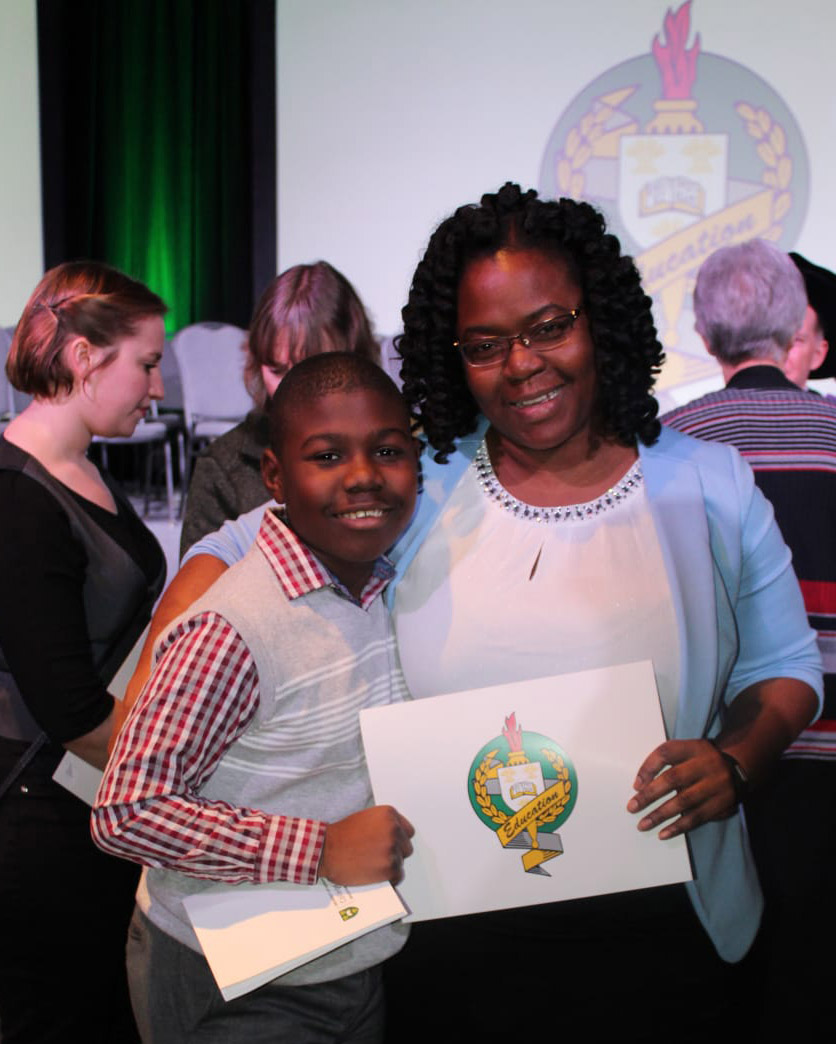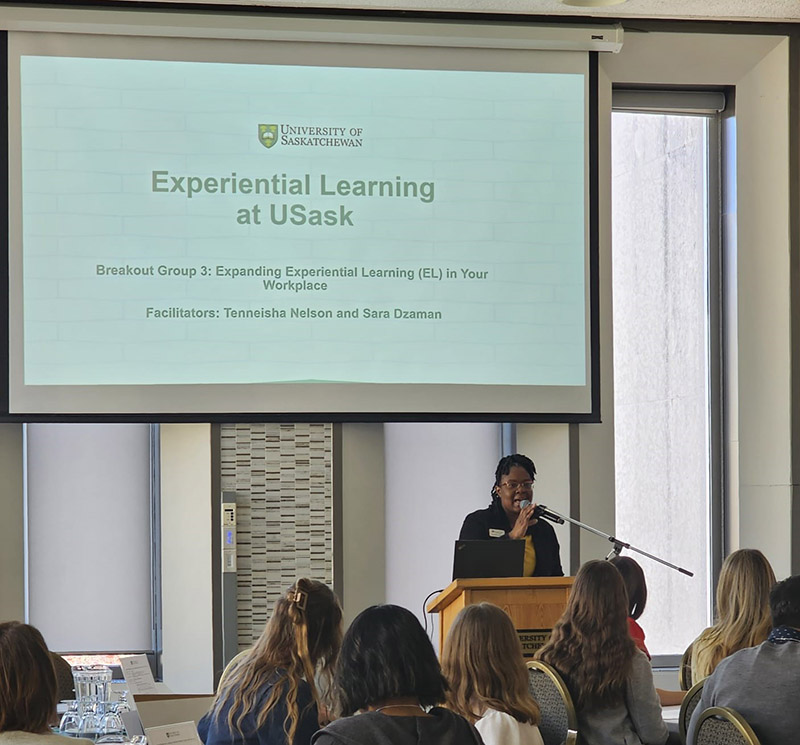
Black History Month: Exploring leadership through education
Dr. Tenneisha Nelson (PhD’20, GPSC’20) supports and empowers USask students and alumni in her role as an experiential learning co-ordinator at Career Services.
By Shannon BoklaschukDr. Tenneisha Nelson (PhD’20, GPSC’20) believes everyone can contribute to the process of leadership, no matter what formal position or job title they hold within an organization.
It’s a message that Nelson conveys through her role in Career Services at the University of Saskatchewan (USask), where she works as an experiential learning co-ordinator. The Career Services unit, part of USask’s Teaching, Learning and Student Experience (TLSE) portfolio, offers career coaching to new and current USask students and alumni. Nelson’s work focuses on leading and managing experiential learning opportunities, resources, and programming, as well as co-ordinating related industry engagement, career education, and campus outreach activities.
The concept of leadership is a topic that has interested Nelson for years—so much so that her doctoral dissertation at USask focused on examining leadership-as-practice in a rural Saskatchewan school. For school improvement initiatives to be effective, Nelson found, everyone has a role to play in the successful implementation—not just the principal.
“In reality, the phenomena of leadership involves more than the actions of a single individual tasked to lead the organization,” Nelson wrote in her 2020 dissertation, which she completed as a PhD candidate in the Department of Educational Administration in USask’s College of Education, under the supervision of Dr. Dawn Wallin (PhD).

Nelson, who is originally from Jamaica, came to USask with the goal of exploring teaching and leadership following her work experience as a radio producer, news editor, university instructor, and public relations specialist. With a master’s degree in human resource development and an undergraduate degree in communication and media studies from the University of the West Indies, Mona, Nelson also worked in communications at the Jamaica Productivity Centre—the national organization responsible for promoting and facilitating productivity improvement in the Caribbean country.
“I mixed my HR training with my media training, and so I was working on projects with schools in Jamaica and with organizations in Jamaica helping them to improve their productivity,” she said. “It was about communicating this technical term to a general audience and creating opportunities to help the general audience understand what productivity was, and why it was important to national productivity.”
As she worked on various projects with schools in Jamaica, Nelson began to develop an interest in school leadership. She realized that while many productivity improvement projects were initiated by school principals, “it was really those persons that were on the ground that executed” the necessary work that led to the projects’ success.
“So, I started thinking about the concept of leadership, and thought of leadership as more than what a principal does,” Nelson said. “And, so, that segued into my next step professionally.”
It was this realization about leadership that inspired Nelson to apply for the PhD program at USask in 2015.
When she moved to Saskatoon from Jamaica with her son, who was nine years old at the time, Nelson realized the challenges and opportunities associated with making a major move or life change.
“I didn’t realize how much my network was important back home until I came here and there was no network. I needed to rebuild from scratch,” she said. “It was pretty much starting over.”
Slowly, but intentionally, Nelson took on the task to build a social network at USask and in Saskatoon. She became proactive about meeting other USask students, including fellow international students from Jamaica, and about learning more about the city and the university. As Nelson made new friends and acquaintances inside and outside of her graduate studies classes, she began to feel more comfortable in her new home.
“I thought, ‘What else can I do to situate myself in this space?’ So, I started to explore different learning opportunities,” she said.
That led her to connect with USask’s Gwenna Moss Centre for Teaching and Learning (GMCTL), which is committed to supporting and improving teaching and learning at USask and offers a variety of programming and resources to help faculty, instructors, and graduate students. Alongside her PhD, Nelson received a Graduate Professional Skills Certificate at USask’s Spring Convocation in 2020. What she learned through the certificate program has proven to be useful in her work.

“I enjoy working with people. I enjoy managing projects. I wanted to build those skills and build a professional network,” she said.
Throughout her time in the PhD program, Nelson honed her skills as an educator. For example, she served as a teaching assistant and was awarded a Teacher-Scholar Doctoral Fellowship through the GMCTL, among other awards and honours. Today, she continues to be a sessional lecturer at USask, teaching the graduate studies course EADM 821: Organizational Behaviour in Education.
Nelson is also finding joy in her full-time job at Career Services. She is well-suited to offering support to students and alumni, particularly students who are newcomers to Canada, due to her lived experiences and her previous employment. Prior to joining the team at Career Services, Nelson worked at the Saskatoon Open Door Society and the Saskatchewan Intercultural Association, where she connected newcomers to resources and mentors in the community. She also served as an international student advisor at Saskatchewan Polytechnic in Prince Albert.
“Those roles predominantly were roles that would see me supporting newcomers, supporting international students, essentially supporting them as they transitioned in a new space,” said Nelson. “Having had the experience, I felt that was fulfilling work.”
In September 2022, Nelson began her current job at USask. At Career Services, she helps to create co-curricular experiential learning opportunities so that students can further develop their professional and career readiness skills. She tells students and alumni that their leadership skills can be developed over time and can be enhanced through collaboration.
“We all interact to make leadership happen,” she said. “Leadership really resides in each of us when we come together and move a project in different directions. It’s not only resident in the person that has a position of power or authority; so, leadership, really, is a practice that we all as individuals contribute to as we work towards a particular end.”
Together we will support and inspire students to succeed. We invite you to join by supporting current and future students' needs at USask.

